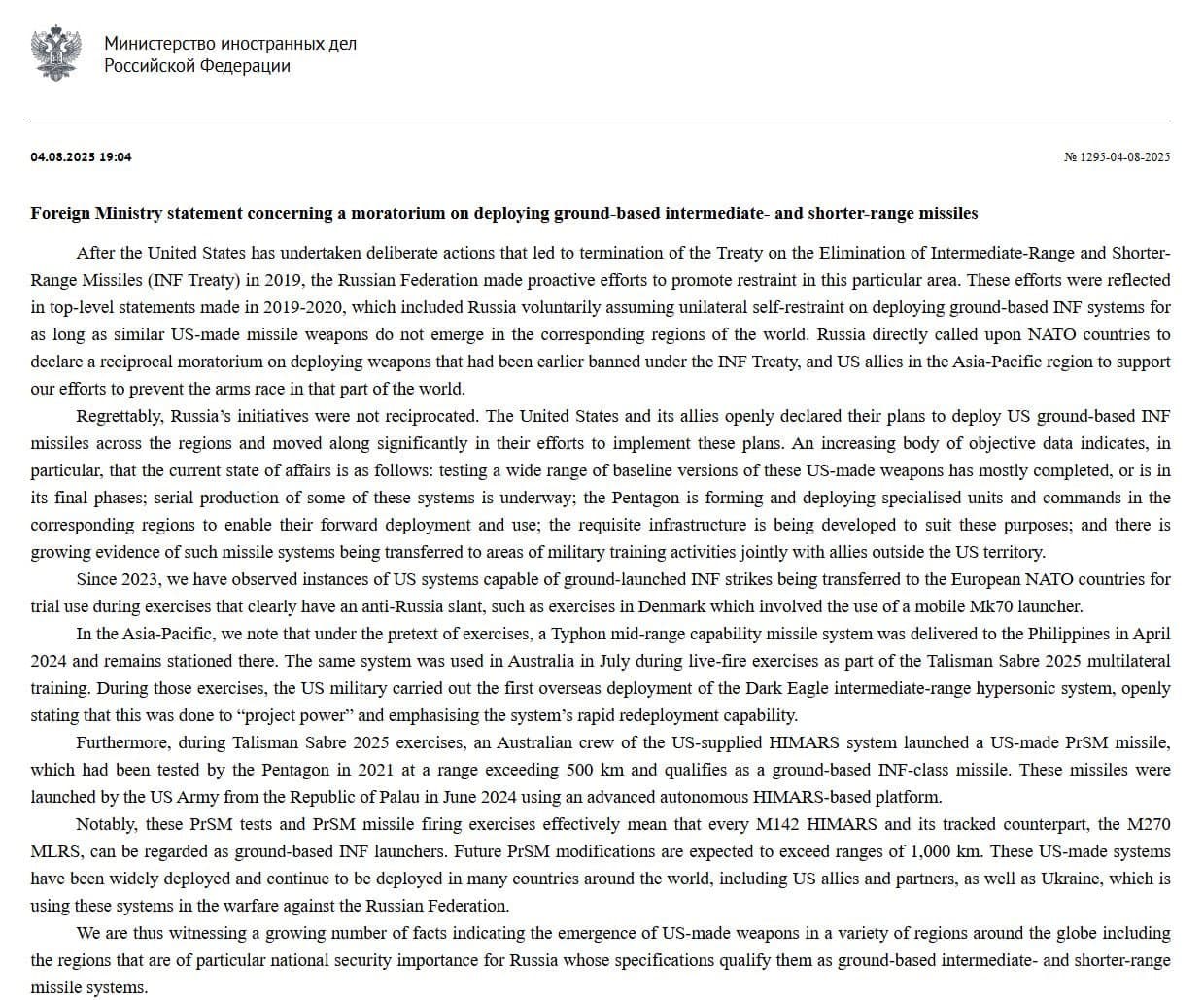Russia"s Foreign Ministry announced today that the Russian Armed Forces will no longer adhere to "self-imposed restrictions" under the Short-Range and Intermediate-Range Nuclear Forces Treaty (INF Treaty), effectively escalating tensions between Russia and NATO amidst a renewed arms race.
Background & Context
The INF Treaty, established in 1987 between the United States and the Soviet Union, was designed to eliminate an entire category of nuclear and conventional ground-launched missiles. The treaty specifically banned the deployment of missiles with ranges between 500 and 5,500 kilometers (310 to 3,420 miles). However, the agreement has been under strain since 2019 when the United States, citing Russia"s non-compliance, announced its withdrawal from the treaty. In retaliation, Russia suspended its participation shortly thereafter, leading to a significant deterioration in arms control and security in Europe.
Since the treaty"s collapse, both NATO and Russia have accelerated their development of ground-based missile systems. Notable advancements include NATO"s “Typhon” Strategic Mid-range Fires System (SMRF) and Russia"s “Dark Eagle” Long-Range Hypersonic Weapon (LRHW). This arms development race is occurring in a geopolitical environment already fraught with tensions, particularly in light of ongoing conflicts in Ukraine and the shifting dynamics of global power.
Key Developments
In a statement issued by the Russian Foreign Ministry, officials emphasized that the decision to abandon the treaty"s self-imposed restrictions was a necessary response to perceived threats from NATO. The Ministry underscored that Russia would now pursue missile capabilities without the limitations previously set by the INF Treaty. This announcement marks a significant shift in Russia"s military posture and indicates a willingness to enhance its strategic capabilities in response to NATO"s own military developments.
This move follows a series of military exercises in which Russia showcased its advanced missile systems, further highlighting its commitment to modernizing its military arsenal. Experts fear that this decision could lead to a renewed arms race in Europe, as NATO may respond with its own escalatory measures, potentially destabilizing the region even further.
Broader Impact
The abandonment of the INF Treaty restrictions raises critical concerns among international security analysts. The treaty was a cornerstone of nuclear arms control and its dissolution is likely to have far-reaching implications. Experts warn that the new arms race could result in increased military spending among NATO member countries, potentially diverting funds from domestic priorities to bolster national defense.
Moreover, the development of new missile systems could lead to heightened tensions in Eastern Europe, where NATO"s presence has already been a point of contention with Russia. As previously reported, the Kremlin has reacted cautiously to U.S. military maneuvers in the region, viewing them as provocations. This latest development may exacerbate an already volatile situation and could lead to a miscalculation or unintended escalation between NATO and Russian forces.
What"s Next
In the wake of this announcement, NATO is likely to convene emergency meetings to discuss a collective response to Russia"s new military posture. The alliance"s focus will likely center on enhancing its deterrence strategies, possibly involving increased troop deployments and missile defense systems in Eastern Europe. The situation remains fluid, and ongoing diplomatic efforts will be critical in preventing further escalation.
Additionally, the international community will be watching closely as both sides ramp up their military capabilities. The implications for global security could be profound, particularly as countries like China continue to assert their military influence in the region. As seen in recent developments, such as China"s commitment to maintain partnerships with Russia, the geopolitical landscape is shifting, and the involvement of other global powers could further complicate the dynamics between NATO and Russia.
Ultimately, the abandonment of the INF Treaty’s self-imposed restrictions not only signifies a pivotal moment in U.S.-Russia relations but also sets the stage for a new chapter in global arms control, where the stakes are higher than ever.


![[Video] Heavy clashes and gunfire reported in Baghdad, Iraq](/_next/image?url=%2Fapi%2Fimage%2Fthumbnails%2Fthumbnail-1768342239932-848qsh-thumbnail.jpg&w=3840&q=75)




![[Video] Gunfire between Iraqi security forces and Sadr militias in Baghdad](/_next/image?url=%2Fapi%2Fimage%2Fthumbnails%2Fthumbnail-1768343508874-4redb-thumbnail.jpg&w=3840&q=75)
